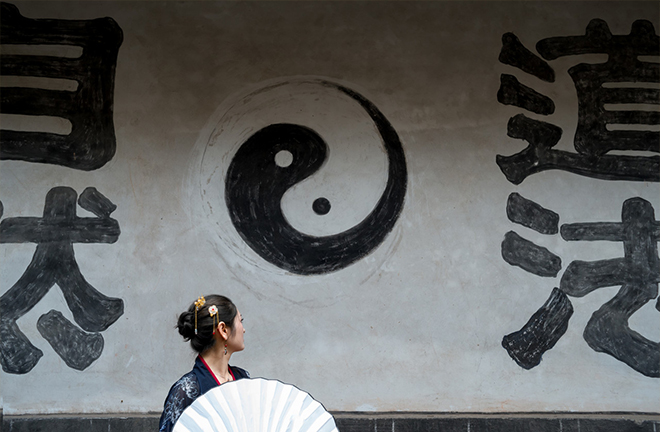Three factors for amplifying the Chinese perspective on foreign literature studies

The theory of change based on the yinyang concept manifests Chinese thinking. Photo: TUCHONG
The introduction and study of foreign literature in China have always been closely linked to the fate of the nation since the very beginning. Over the past century of development, it has been inseparable from the historical mission of the great rejuvenation of the Chinese nation. In the current era of building China into a great modern country, foreign literature studies must increasingly emphasize a Chinese perspective. In essence, this research involves three elements: problems, thinking, and values.
The Chinese perspective is closely related to the unique attributes of Chinese thought. This mode of thought originally stems from the theory of change based on the yinyang concept, which emphasizes the connection and transformation of contradictions, as well as the principles of “moderation” and “harmony.” Western thinking emphasizes the “logocentrism” of “binary opposition,” emphasizing the opposition and struggle of contradictions. European and American literary works often depict the mutual opposition of good and evil, with conflicts typically resolved through the triumph of one side over the other.
In the past, we have often overlooked the study of these differences in thought, therefore few Chinese scholars studied and analyzed foreign works through the lens of Chinese philosophy and cognitive styles. As a result, many studies fail to produce conclusions that reflect a distinctly Chinese perspective. Today, as various conflicts become more pronounced—especially the intensifying clashes between humans and nature, and between science and technology and the humanities—there is a greater need to use Chinese thinking to resolve these conflicts. We should recognize that conflicts in the world do not always manifest as sharp oppositions of right versus wrong, nor do they always result in simple victories or defeats. In fact, Chinese thought places greater emphasis on the interdependent and transformative relationships between people and others. Under certain conditions, opposing sides of a conflict can indeed transform into one another. When we integrate the crucial defining factor of “under certain conditions” into traditional dialectical principles, Chinese dialectics evolves into a new form, blending Marxist dialectics with ancient Chinese philosophical dialectics. Mastering Chinese thinking manifests as having a Chinese perspective when addressing issues.
The Chinese perspective is closely intertwined with the pursuit of Chinese values. At the core of Chinese cultural values are concepts such as the harmony between humanity and nature, the unity of family and nation, self-reflection, collectivism, perseverance and the relentless pursuit of self-improvement. It is these values that have sustained the continuous development of Chinese civilization. In our studies of foreign literature, a significant phenomenon merits attention: since the 20th century, Western writers have undergone a shift in their creative tendencies, moving from the exaltation of national and ethnic consciousness to the exploration of “the fate of humanity.”
Liu Jianjun is a professor from the School of Foreign Languages at Shanghai Jiao Tong University.
Edited by ZHAO YUAN

 PRINT
PRINT CLOSE
CLOSE